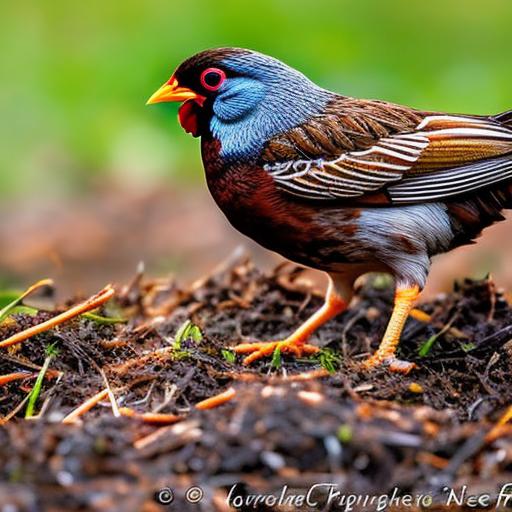Chickens are fascinating creatures that have been domesticated for thousands of years. They are not only a source of food, but also provide numerous benefits to a garden. Understanding the behavior of chickens is essential for anyone considering keeping them in their garden. By understanding their natural behavior, you can create an environment that meets their needs and ensures their well-being.
Key Takeaways
- Chickens are social animals that have a natural pecking order and enjoy dust baths.
- Having chickens in your garden can provide fresh eggs, natural pest control, and fertilizer.
- Downsides of having chickens include noise, mess, and potential damage to plants.
- Consider factors such as climate, space, and temperament when choosing a chicken breed for your garden.
- Building a secure chicken coop and designated areas for them to roam can prevent damage to your garden and keep them safe.
Understanding the natural behavior of chickens
Chickens are social animals that thrive in groups. They have a hierarchical social structure, with a dominant rooster and a pecking order among the hens. Understanding their social behavior is important for creating a harmonious environment for your chickens. Providing enough space and resources, such as food and water, is crucial to prevent aggression and stress among the flock.
Feeding behavior is another important aspect of chicken behavior to understand. Chickens are omnivores and have a natural instinct to scratch and peck at the ground in search of food. They enjoy foraging for insects, worms, and plants. Providing them with a balanced diet that includes grains, vegetables, and protein sources is essential for their health and well-being.
Nesting behavior is also an important aspect of chicken behavior to consider. Chickens have a natural instinct to find a safe and comfortable place to lay their eggs. Providing nesting boxes filled with soft bedding material, such as straw or wood shavings, will encourage your hens to lay their eggs in a designated area.
The benefits of having chickens in your garden
Having chickens in your garden can provide numerous benefits. One of the most obvious benefits is fresh eggs. Chickens that are well-cared for and provided with a balanced diet will lay delicious and nutritious eggs. You can enjoy the satisfaction of collecting your own eggs every day and knowing exactly where they came from.
Chickens also provide natural pest control in your garden. They love to eat insects, slugs, and other pests that can damage your plants. By allowing your chickens to roam freely in your garden, they will help keep the pest population under control, reducing the need for chemical pesticides.
Another benefit of having chickens in your garden is the fertilizer they provide. Chicken manure is rich in nutrients and can be used to fertilize your garden beds. By allowing your chickens to roam freely in your garden or by collecting their manure and composting it, you can create a natural and sustainable source of fertilizer for your plants.
The downsides of having chickens in your garden
| Downsides of Having Chickens in Your Garden |
|---|
| 1. Noise pollution from constant clucking and crowing |
| 2. Foul odor from chicken droppings |
| 3. Destruction of garden plants and flowers |
| 4. Risk of disease transmission to humans and other animals |
| 5. Increased presence of pests such as flies and rodents |
| 6. Responsibility of daily care and maintenance |
| 7. Potential legal issues with neighbors or local ordinances |
While there are many benefits to having chickens in your garden, there are also some downsides to consider. One of the main downsides is the noise that chickens can make. Roosters, in particular, can be quite loud and may disturb your neighbors. If you live in an urban or suburban area, it may be best to choose a breed that does not require a rooster.
Chickens can also create a mess in your garden. They scratch and peck at the ground, which can disturb plants and create bare patches of soil. They also produce droppings, which can accumulate and create an unpleasant odor. Regular cleaning and maintenance of their coop and designated areas can help minimize the mess.
Predators are another challenge to consider when keeping chickens in your garden. Chickens are vulnerable to predators such as foxes, raccoons, and hawks. It is important to provide secure fencing and housing to protect your chickens from these threats. Regularly inspecting and reinforcing your coop and run will help keep your chickens safe.
Choosing the right chicken breed for your garden
When choosing a chicken breed for your garden, there are several considerations to keep in mind. First, consider the size of your garden and the amount of space you have available. Some breeds are more suited to small spaces, while others require more room to roam.
Another consideration is the climate in your area. Some breeds are better suited to cold climates, while others thrive in warmer climates. Researching the specific needs and characteristics of different breeds will help you choose the right breed for your garden.
Some popular breeds for backyard gardens include the Rhode Island Red, the Plymouth Rock, and the Sussex. These breeds are known for their friendly temperament, good egg production, and adaptability to a variety of climates.
Building a chicken coop to keep them contained

Building a chicken coop is essential for keeping your chickens contained and safe. The coop should provide shelter from the elements, protection from predators, and a comfortable space for your chickens to roost and lay eggs.
When building a chicken coop, you will need materials such as wood, wire mesh, nails, and screws. The design of the coop will depend on the number of chickens you plan to keep and the available space in your garden. It should include nesting boxes, roosting bars, and a secure door.
Considerations for design include proper ventilation to prevent moisture buildup and adequate insulation to keep your chickens warm in colder months. The coop should also be easy to clean and maintain.
Tips for building a coop include ensuring that it is predator-proof by using sturdy materials and burying wire mesh around the perimeter to prevent digging. Providing enough space for each chicken is also important to prevent overcrowding and aggression.
Creating designated areas for chickens to roam
While it is important to keep your chickens contained in a coop for their safety, it is also beneficial to provide them with designated areas to roam freely. Free-range chickens have access to fresh air, sunlight, and natural foraging opportunities.
Designing a chicken run involves creating a secure fenced area where your chickens can safely roam during the day. The size of the run will depend on the number of chickens you have and the available space in your garden. It should be large enough to allow them to move around and engage in natural behaviors such as scratching and pecking.
Tips for creating a safe and secure chicken run include using sturdy fencing materials, burying wire mesh around the perimeter to prevent digging, and providing shade and shelter from the elements. Regularly inspecting and maintaining the run will help ensure its integrity.
Using fencing to protect your garden beds
Chickens can be destructive to garden beds, so it is important to protect your plants from their scratching and pecking. Fencing is an effective way to keep chickens out of your garden beds while still allowing them to roam freely in other areas of your garden.
There are several types of fencing that can be used to protect your garden beds. Chicken wire is a popular option as it is affordable and easy to install. It should be buried at least 6 inches deep to prevent chickens from digging under it.
Another option is electric fencing, which provides a mild shock when touched by a chicken. This can be an effective deterrent, but it requires regular maintenance and monitoring.
When installing fencing, make sure it is tall enough to prevent chickens from flying over it. Regularly inspecting and maintaining the fencing will help ensure its effectiveness.
Providing alternative sources of entertainment for your chickens
Keeping chickens entertained is important for their mental and physical well-being. Boredom can lead to behavioral problems such as feather picking and aggression. Providing alternative sources of entertainment will keep your chickens happy and healthy.
There are many DIY chicken toys that you can make using simple materials such as PVC pipes, hanging treats, or even a mirror. These toys provide mental stimulation and encourage natural behaviors such as pecking and scratching.
Tips for keeping chickens entertained include providing perches or roosting bars at different heights, offering a variety of treats and food puzzles, and allowing them to forage in different areas of your garden.
Regularly rotating and introducing new toys and treats will keep your chickens engaged and prevent boredom.
Using chicken manure as fertilizer for your garden
Chicken manure is a valuable source of nutrients for your garden. It is rich in nitrogen, phosphorus, and potassium, which are essential for plant growth. Using chicken manure as fertilizer can improve soil fertility and promote healthy plant growth.
To use chicken manure in your garden, it is important to compost it first. Fresh chicken manure is high in ammonia and can burn plants if applied directly. Composting allows the manure to break down and reduces the risk of burning.
To compost chicken manure, mix it with carbon-rich materials such as straw or wood shavings. Turn the compost regularly to ensure proper decomposition. Once the compost is fully decomposed, it can be added to your garden beds or used as a top dressing around plants.
Precautions to take when using chicken manure include wearing gloves and a mask when handling it, as it can contain harmful bacteria. It is also important to avoid using fresh manure on edible crops that will be harvested soon, as there is a risk of contamination.
Balancing the benefits and challenges of having chickens in your garden
Having chickens in your garden comes with both benefits and challenges. It is important to find the right balance that meets the needs of your chickens while also considering the impact on your garden and neighbors.
Recap of benefits and challenges:
– Benefits include fresh eggs, natural pest control, and fertilizer for your garden.
– Challenges include noise, mess, and predators.
Tips for finding the right balance include:
– Choosing the right breed for your garden.
– Providing adequate space and resources for your chickens.
– Regularly maintaining and cleaning their coop and designated areas.
– Protecting your garden beds with fencing.
– Keeping chickens entertained with toys and treats.
– Using chicken manure as fertilizer responsibly.
By finding the right balance, you can enjoy the benefits of having chickens in your garden while minimizing the challenges.
Understanding the behavior of chickens is essential for anyone considering keeping them in their garden. By understanding their natural behavior, you can create an environment that meets their needs and ensures their well-being. Chickens provide numerous benefits to a garden, including fresh eggs, natural pest control, and fertilizer. However, there are also challenges to consider, such as noise, mess, and predators. By finding the right balance and implementing strategies to address these challenges, you can enjoy the many benefits of having chickens in your garden.
If you’re looking for tips on how to keep chickens out of your mulch beds, you might also be interested in learning about different types of chicken coops that can help protect your garden. Check out this article on the best kind of coop for chickens, which provides valuable information on various coop options such as the Snaplock Chicken Coop, turning a shed into a chicken coop, the Producers Pride Sentinel Chicken Coop, and more. By choosing the right coop design, you can create a safe and secure environment for your chickens while keeping them away from your precious mulch beds. (source)
FAQs
What are mulch beds?
Mulch beds are areas in a garden or landscape that are covered with a layer of organic or inorganic material to help retain moisture, suppress weed growth, and regulate soil temperature.
Why do chickens like to scratch in mulch beds?
Chickens are natural foragers and enjoy scratching in mulch beds to search for insects, worms, and other small creatures to eat. They also like to dust bathe in the loose material.
What problems can chickens cause in mulch beds?
Chickens can cause damage to plants and mulch by scratching and digging in the beds. They can also spread mulch around, making it less effective at retaining moisture and suppressing weeds.
How can I keep chickens out of my mulch beds?
There are several methods to keep chickens out of mulch beds, including using physical barriers like fencing or netting, creating designated foraging areas for the chickens, and using natural deterrents like citrus peels or cayenne pepper.
Is it safe to use mulch around chickens?
Yes, it is safe to use mulch around chickens as long as it is not toxic or harmful to them. Avoid using mulch made from cocoa bean shells, which can be toxic to chickens if ingested. Stick to natural materials like straw, hay, or wood chips.
Meet Walter, the feathered-friend fanatic of Florida! Nestled in the sunshine state, Walter struts through life with his feathered companions, clucking his way to happiness. With a coop that’s fancier than a five-star hotel, he’s the Don Juan of the chicken world. When he’s not teaching his hens to do the cha-cha, you’ll find him in a heated debate with his prized rooster, Sir Clucks-a-Lot. Walter’s poultry passion is no yolk; he’s the sunny-side-up guy you never knew you needed in your flock of friends!







